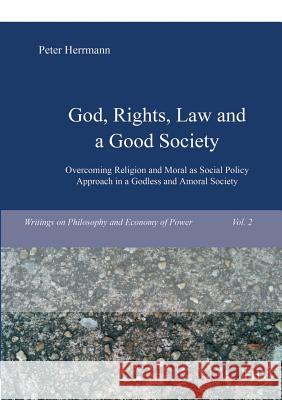God, Rights, Law and a Good Society » książka
God, Rights, Law and a Good Society
ISBN-13: 9783867417709 / Angielski / Miękka / 2012 / 176 str.
Recent debates on and around the economic crisis frequently highlighted the issue of rights: social rights, fundamental rights and human rights ..., and not least the question of ethics and politics. Politics and ethics are surely a major issue, both part of a complex hegemonic system. And equally important is to think about rights on the said level in more complex ways, seeing them not as static or simply developing in a linear way towards any kind of an 'absolute idea'. Equally misleading is thinking about rights in terms of relativism, leaving their definition to discourses and making them negotiable. The present author, bringing different perspectives from social policy, social work and economics together and drawing on extensive experiences from different regions of the world, aims on overcoming both, relativist and moralist stances. Not least, this continues the elaboration from the first chapter of the previous volume of the 'Writings on Philosophy and Economy of Power' (the Prolegomena in the 'New Princedoms', published 2011 at Rozenberg, Amsterdam). One important aim of this second volume of the 'Writings on Philosophy and Economy of Power' is to localise the changes of the current mode of regulation in a more fundamental way, emphasising the need to elaborate the changes of the political economy. The guiding question can be spelled out in a nutshell: 'Do we face a new renaissance?'
Recent debates on and around the economic crisis frequently highlighted the issue of rights: social rights, fundamental rights and human rights , and not least the question of ethics and politics. Politics and ethics are surely a major issue, both part of a complex hegemonic system. And equally important is to think about rights on the said level in more complex ways, seeing them not as static or simply developing in a linear way towards any kind of an absolute idea . Equally misleading is thinking about rights in terms of relativism, leaving their definition to discourses and making them negotiable. The present author, bringing different perspectives from social policy, social work and economics together and drawing on extensive experiences from different regions of the world, aims on overcoming both, relativist and moralist stances. Not least, this continues the elaboration from the first chapter of the previous volume of the Writings on Philosophy and Economy of Power (the Prolegomena in the New Princedoms , published 2011 at Rozenberg, Amsterdam). One important aim of this second volume of the Writings on Philosophy and Economy of Power is to localise the changes of the current mode of regulation in a more fundamental way, emphasising the need to elaborate the changes of the political economy. The guiding question can be spelled out in a nutshell: Do we face a new renaissance?











